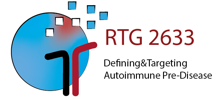Jana Buhre

Influence of anti-TNF treatment on B cell responses and the type of IgG Fc glycosylation
Background. Patients who develop rheumatoid arthritis (RA) often start to express IgG autoantibodies (autoAbs) years before developing overt clinical symptoms of the disease. Furthermore, healthy individuals can express IgG autoAbs in the absence of disease symptoms. A correlation has been found between the development of RA and a higher proportion of agalactosylated IgG forms (Pfeifle et al, Nat Immunol 2017; 18:104 (PMID: 27820809)). Agalactosylated IgG Abs have been linked to inflammatory functions, whereas galactosylated and terminal sialylated IgG Abs exhibit less inflammatory or anti-inflammatory properties (Bartsch et al, Front Immunol 2018; 9:1183 (PMID: 29928274)). Improvement of RA symptoms in patients as a result of anti-TNF therapy has been associated with increased galactosylation and sialylation of the IgG Fc region. However, the underlying mechanisms are unclear. To gain a better understanding of the role of TNF in B cell and IgG responses, we are investigating the influence of anti-TNF treatment in mice and in patients with inflammatory (auto)immune diseases upon SARS-CoV-2 immunization.
Objectives. To investigate the development of germinal center (GC) reactions, memory B cells, plasma cells (PCs) and IgG (auto)Ab subclass Fc glycosylation in mice and humans treated with anti-TNF.
Work program. We will study mice treated with anti-TNF. We will also study patients with inflammatory (auto)immune diseases treated with anti-TNF following SARS-CoV-2 vaccination. The total and/or antigen-specific IgG Fc glycosylation patterns will be investigated using high-performance liquid chromatography (HPLC) and/or liquid chromatography-mass spectrometry (LC-MS), and immune cells will be investigated using flow cytometry.

- People
- Doctoral researchers
- Merabell Adem
- Katja Adriany
- Farbod Bahreini
- Aderiike Babarinsa
- Isha Barve
- Estelle Bergmann
- Swayanka Biswas
- Noa Linn Brauckmann
- Christoph Brieske
- Jana Buhre
- David De Luca Laredo
- Felicitas Eichlohn
- Kaan Ersoy
- Ferdinand Gebauer
- Lennart Gooß
- Fatemeh Gorzin
- Maja Grote
- Alanis Barbosa Gulde
- Jiaxi Guo
- Sen Guo
- Veronika Hartmann
- Michelle Hein
- Marie Jaboreck
- Luise Janusch
- Maj Jäpel
- Jakia Khan
- Anna Knauer
- Valentin Kneitz
- Philipp Köcher
- Maximilian Lahmer
- Wing Yu Lee
- Jian Liu
- Isabelle Luckow
- Kristina Manzhula
- Daniel Mehlberg
- Sahar Mehrabani
- Afsaneh Mehrpouyan
- Yasaman Mirzaee
- Sadegh Mousavi
- Danial Namazi
- Dennis Niese
- Roqayeh Noori
- Milica Novovic
- Josepha Nunold
- Ludwig Ohlrogge
- Justus Ohmes
- Bianca Opelka
- Colin Osterloh
- Anne-Sophie Pagel
- Cristian Papara
- Isa Popken
- Tina Rastegar Lari
- Daniel Rohling
- Felix Sajon
- Rochi Saurabh
- Alessia Maria Sbaraglia
- Jovan Schanzenbacher
- Mareile Schlotfeldt
- Carolin Schmidt
- Solveig Lea Schmidt
- Leon Schmidt-Jiménez
- Nora Schoell
- Lena Schröder
- Hannah Schumacher
- Salomini Sinnathurai
- Sarah Stenger
- Lene Sophie Urban
- Chiara Walczyk
- Nele Wellbrock
- Julia Wimmer-Gross
- Pia Witt
- Natalia Zappe
- Kiana Zarabadi
- Jianrui Zheng
- Luca Zillikens
- Carla Zünkeler
- Participating researchers
- Early career researchers
- Administration
- Finished doctoral degrees
- Doctoral researchers


